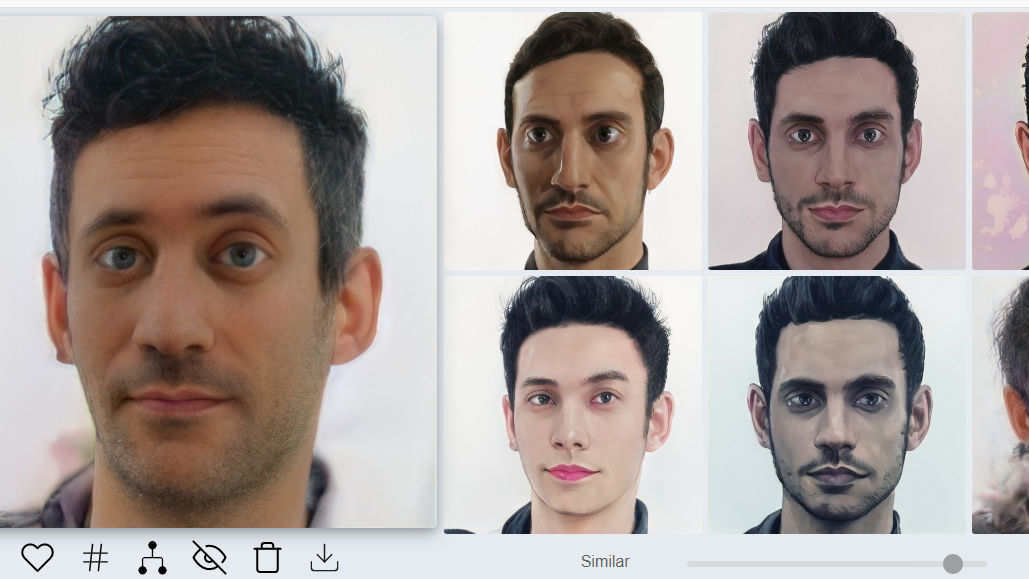
By Giacomo Lee on July 21, 2020
How do you use Artbreeder, and should you use it?
When discussions of AI and its effect on the labour force come up, the creative industry usually shrugs its shoulders. After all, how can artificial intelligence accurately replicate an artist’s singular vision?
It’s an understandable stance, but recent weeks may have sent a little shiver down creatives’ spines. Only yesterday did Fast Company reveal that a designer commissioned by clients (below) turned out to be an AI system employed by one very adventurous design firm.

AI art generator Artbreeder meanwhile has grabbed attention through Bas Uterwijk’s photo portraits of historical figures, all of which were generated from classic painted portraits. The photos, as seen here on Designboom, are remarkably polished and authentic. But would it work the other way around? Can equally excellent art stem from machine manipulated photos?
Artbreeder isn’t the only AI art platform out there, but it’s certainly grabbed the most attention. The website combines and manipulates any kind of image to produce countless variations using the magic of machine-learning, giving you the option to make landscapes, anime figures, portraits and more (and don’t worry, all these images remain automatically private unless you choose otherwise.)

You can upload an image and let the website do the heavy lifting, or toggle features using its Edit-Genes tab. On portraits this allows you to change colours, race and accessories (adding facial hair or glasses), allowing the same for cartoonish anime and ‘furry’ creations, minus the last two options. Artbreeder also animates everything except anime characters, which might sadden the weaboos out there.

First up, note that you can only upload photos for the portrait and landscape sections. Everything else gives you a series of random images to play about with using slider controls; refresh the set if you’d prefer different options.
You can play with a given selection for the portraits and landscapes workspaces, but these are the fun ones which let you upload any image, as many have been doing in recent months.
With these photos you can generate new faces and landscapes as sourced from the original, either in photorealistic or impressionist form. Just use the slider controls with the ‘Children’ tab for these; if you get bored, you can ‘Crossbreed’ your upload with a public image from the database or another of your own.
Just be careful as you slide: whatever catches your eye won’t be there when you toggle back as each ‘push’ creates a whole new series of variants. Save what you see as soon as you see it to avoid any disappointment.

Note that each image you upload is instantly converted, meaning it won’t look like the one on your phone or hard drive. This variant of the original is what all the Children are based off, but you can tinker with this master copy using the Edit-Genes tab mentioned earlier.
As a free account user, you can upload up to five images in total. In order to do anything with your personal imagery, you have to click on the relevant page (Portrait, Landscape) and upload from there; images aren’t stored in the cloud for you to share across sub-platforms. In other words, if you upload four pics in one of the Portrait tabs, you’ll only be able to upload one Landscape pic, and that’ll be the only one you can manipulate aside from the ones given to you by Artbreeder.
There are two Portrait pages. The others is marked as ‘Old’, presumably meaning it uses older networks instead of generating more classical-style portraits as you’d think; I preferred the results of the more current option.
No matter what section you use, you can create and download as many animations as you like. There is a limit on how many high-res versions you can download of your creations; paying allows you to save and upload more.

But would we recommend you to pay? And should artists be worried about websites like this? Judging by the portraits created, the answer right now would be no. Paintings generated are very rarely lifelike (if that’s what you’re looking for) and I noticed a limited output of painting styles; also, most faces look creepy and ‘off’; there’s barely anything cosy here. It can also take a while to upload a photo due to the popularity of the site; depending on time of day, processing can last up to an hour when queued.
The more impressive results though came from landscapes. While again not entirely faithful recreations, turning my industrial city-scape into a fantasy mountain scene, Artbreeder’s BigGAN models resulted in these very impressive worlds; here’s the original version I uploaded for you to compare with its ‘remixes’ below it.






Game environment artists may be intrigued by these results, and no doubt the software at work is improving as we speak. With an improved website, Artbreeder could be a very creepy ‘rival’ for digital artists indeed.